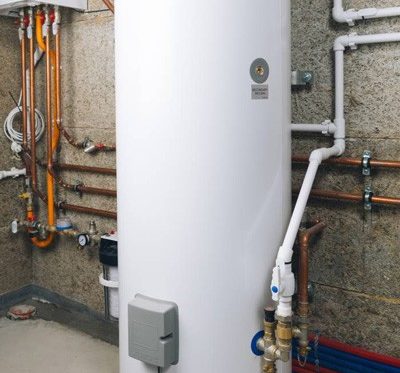Water heaters are essential HVAC appliances because they heat water that you use to cook, wash, or clean. They take in cold water from the supply pipe, heat it, and then supply it throughout your home. Water heaters can be classified according to the source of heat or how they store water. When you classify them according to the heat source, we have gas water heaters, electric water heaters, geothermal water heaters, and solar-powered water heaters. When classified according to storage type, we have tankless water heaters and storage tank water heaters.
Storage Tank Water Heaters
Storage tank water heaters or conventional heaters are the most common water heaters used in many homes. They consist of a large tank that is insulated to prevent heat loss where the water is stored. They can be powered by natural gas, electricity, oil, or liquid propane.
They work by heating cold water to a pre-set temperature and stored in the insulated tank. When all of it is used up or when it drops below the designated temperature, the heater reheats the water. The unit keeps running the cycle over and over again, meaning it’s continuously in use. Conventional water heaters are very cost effective in the long run. They require little or no maintenance and last for a very long time.
Conventional water heaters have low installation costs depending on where you plan to install them. They are also efficient across all climates.
On the other side, conventional water heaters take up a considerable amount of space. It is crucial that you get the right-sized tank. If you have a small tank, you may easily run out of hot water since they take at least an hour to reheat the water. If the water tank is too large, you may waste energy by heating hot water that you don’t use.
Tankless Water Heaters
Tankless water heaters or on-demand water heaters can produce a constant and unlimited supply of hot water. They are very convenient and are growing in popularity in many homes. These units do not use storage tanks to store hot water but rather heat water instantly whenever it is needed. On-demand water heaters work by running cold water through super-heated coils that heat the water.
On-demand costs more than conventional hot water systems. They are ideal for use for large families since they supply hot water constantly. Tankless water heaters are available in various capacities. You should ensure that you get one appropriate for the number of people in your household. Additionally, on-demand water heaters are very energy efficient since they only heat water when required.
Tankless water heaters require annual maintenance to avoid corrosion and ensure they are working efficiently. Since on-demand water heaters do not use a storage tank, they can save some space in your home. You can easily install them near water outlets or on the walls.
On the other hand, tankless water heaters have high installation costs compared to conventional water heaters. However, they cost less to operate monthly, and you don’t run out of hot water no matter how many people are using hot water in your household.
Heat Pump Water Heater
Heat pump water heaters or hybrids do not have a direct power source but rather use heat from the ground or air to heat water. The heat used to increase the water temperature is captured from the air or ground and then passed through the system. These systems are very energy efficient and use up less power than conventional water heaters.
Heat pump water heaters have large storage tanks that are insulated to prevent energy loss. The tanks store water just like in conventional water heaters. However, they take up more space since they have large pumps on top of the storage tanks. They also need to have enough space around them, typically eight feet, to operate efficiently. Heat pump water heaters have long-term efficiency and require less maintenance.
If you are looking for quality heat pump installation, look no further than Summit Heating & A/C. We have over two decades of services delivery to the residents of Denver and to operate with a high level of integrity. We guarantee 100% customer satisfaction and respond quickly to installation requests.
You cannot install heat pumps in cold areas or locations with cold climates since they draw heat from the air or ground. Heat pumps have high initial costs compared to conventional systems. However, they will make up for the high purchase and installation cost in a few years since they are energy efficient. They require frequent cleaning to avoid the buildup of minerals or sediments. Heat pumps have a low service lifespan, typically lasting for about 10 years.
Solar-Powered Hot Water Heaters
Solar-powered water heaters harness energy from the sun and use it to heat water. They are ideal in areas with warm climates. Like conventional water heaters, they also have large storage tanks that are insulated to prevent heat loss. Solar water heaters are highly energy efficient since they use the energy from the sun, which is renewable.
You can install your solar system water heater on the roof with the solar panels or inside your home. Installing an electric or gas back will help to heat the water when the solar panels cannot get enough energy from the sun to heat your water.
Even though solar system water heaters are expensive to install, they can end up saving you a lot of money in the long run. You also must install solar panels on the roof, meaning you have to dedicate a portion of your roof space to accommodate the number of solar panels required to produce sufficient energy. You also have to empty the storage tank every year to prevent mineral and sediment buildup.
Condensing Water Heaters
Condensing water heaters utilize hot exhaust fumes to heat water. They are ideal for homes that use natural gas as their main energy source and for cooler climates. These heaters store cold water in storage tanks and use a coil at the bottom of the tank to channel gas fumes to heat the water. This makes them extremely energy efficient since little additional power is used.
Condensing water heaters are environmentally friendly and have low running costs. However, they require a large water tank to operate effectively, which is not available in small-sized units. They are also best suited for homes that have year-round heating.
Parts of a Water Heater
When looking at the parts of a water heater, we must consider both electric and gas water heaters. They have common parts although they have a few differences. Here are the common parts found on both types of heaters:
- Dip tube – A dip tube runs almost to the bottom of the tank and connects to the cold water inlet. It allows cold water to enter the tank at the bottom to fill the space left by the hot water that rises to the top.
- Gas burner – The gas burner is found only on gas water heaters and heats the water by releasing extremely hot air through a chimney.
- Electric heating element – The electric heating element heats water in an electric water heater.
- Heat-out pipe – The heat–out pipe moves the hot water on top of the tank throughout your home.
- Thermostat – The thermostat allows you to set the desired temperature for your hot water.
- T&P valve – The temperature and pressure-relief valve act as protective measures. They open to release water if the pressure inside the tank is too high or the water is too hot, preventing the water heater from exploding.
- Drain valve – The drain valves help drain the water in the heater to avoid the buildup of minerals and sediments.
- Anode rod – The anode rod protects the water heater from rusting by rusting faster than the water tank.
- Insulation – The insulation prevents heat loss and keeps the water in the storage tank warm for a longer period.
Summit Heating & A/C provides quality HVAC services for the Denver Metro and surrounding Colorado area, including heating and cooling maintenance, repair, and installation as well as air quality services and water heater repair and maintenance. Our technicians are NATE certified, and we offer free estimates on new HVAC system installations. Contact Summit Heating & A/C today for more information!


